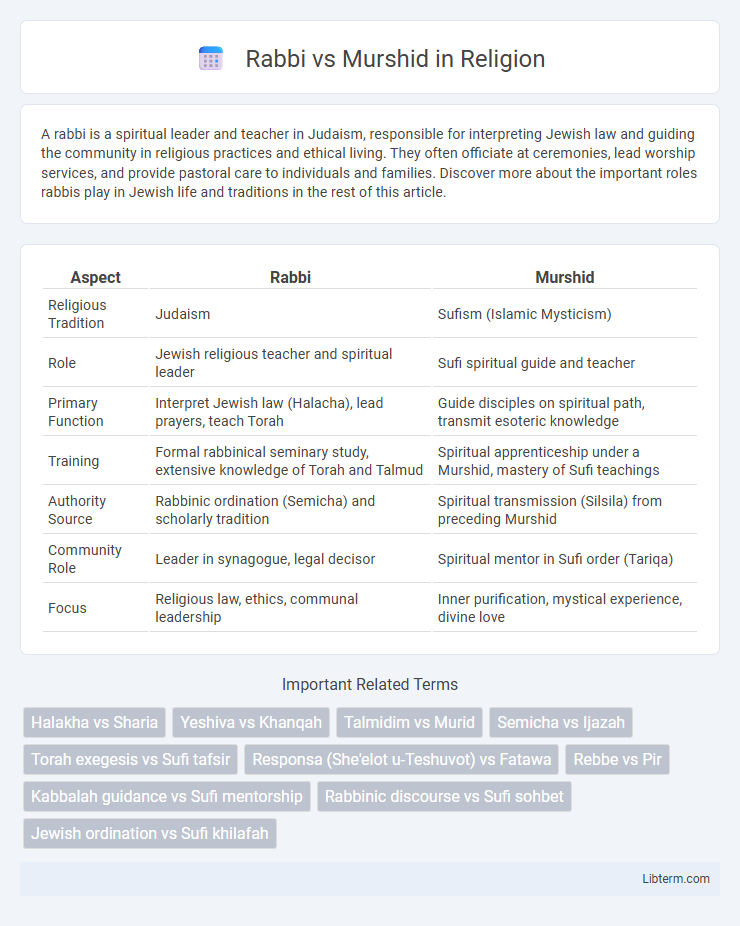A rabbi is a spiritual leader and teacher in Judaism, responsible for interpreting Jewish law and guiding the community in religious practices and ethical living. They often officiate at ceremonies, lead worship services, and provide pastoral care to individuals and families. Discover more about the important roles rabbis play in Jewish life and traditions in the rest of this article.
Table of Comparison
| Aspect | Rabbi | Murshid |
|---|---|---|
| Religious Tradition | Judaism | Sufism (Islamic Mysticism) |
| Role | Jewish religious teacher and spiritual leader | Sufi spiritual guide and teacher |
| Primary Function | Interpret Jewish law (Halacha), lead prayers, teach Torah | Guide disciples on spiritual path, transmit esoteric knowledge |
| Training | Formal rabbinical seminary study, extensive knowledge of Torah and Talmud | Spiritual apprenticeship under a Murshid, mastery of Sufi teachings |
| Authority Source | Rabbinic ordination (Semicha) and scholarly tradition | Spiritual transmission (Silsila) from preceding Murshid |
| Community Role | Leader in synagogue, legal decisor | Spiritual mentor in Sufi order (Tariqa) |
| Focus | Religious law, ethics, communal leadership | Inner purification, mystical experience, divine love |
Introduction: Rabbi vs Murshid
A Rabbi is a Jewish religious leader and teacher who interprets Jewish law and guides the community in spiritual and ethical matters. A Murshid, in contrast, is an Islamic spiritual guide or Sufi master who leads disciples on the path of tasawwuf (Sufism), emphasizing inner purification and mystical union with God. Both roles serve as pivotal figures in their respective traditions, providing religious instruction, moral guidance, and support to their followers.
Historical Origins of Rabbis and Murshids
Rabbis trace their historical origins to ancient Judaism, emerging as religious teachers and interpreters of the Torah around the 1st century CE, particularly after the destruction of the Second Temple. Murshids originate in the Sufi Islamic tradition, rooted in early Islamic mysticism from the 8th century onwards, serving as spiritual guides who lead disciples on the path of inner purification and closeness to God. Both roles evolved within distinct religious and cultural contexts, shaping leadership models that emphasize knowledge, guidance, and spiritual mentorship.
Core Roles and Responsibilities
Rabbi serves as a spiritual leader and teacher within Judaism, responsible for interpreting religious texts, leading worship services, and providing guidance on Jewish law and ethical matters. Murshid functions as a guide and mentor in Sufism, offering spiritual instruction, facilitating disciples' inner growth, and ensuring adherence to the path of divine knowledge (Tariqa). Both roles emphasize mentorship, religious education, and fostering a deep, personal connection to faith, though they operate within distinct religious traditions and frameworks.
Religious Texts and Teachings
A Rabbi primarily interprets and teaches the Torah, Talmud, and other Jewish religious texts, emphasizing Halakhic law and ethical guidance within Judaism. In contrast, a Murshid guides disciples in Sufi Islamic traditions, focusing on the Qur'an, Hadith, and spiritual practices aimed at achieving inner purification and closeness to Allah. Both roles involve deep exegetical knowledge but differ in doctrinal foundations and ritual applications specific to Judaism and Sufism.
Paths to Leadership: Training and Ordination
Rabbi training involves rigorous academic study at yeshivas or rabbinical schools, focusing on Jewish law, Talmudic texts, and pastoral care, culminating in formal ordination known as semicha. Murshid leadership requires spiritual mentorship under a Sufi master, emphasizing experiential learning, purification, and mystical practices before receiving authorization (ijazah) to guide disciples. Both paths demand deep commitment and recognition by established religious authorities, ensuring leaders are well-prepared to serve their communities.
Community Guidance and Influence
A Rabbi serves as a spiritual leader and legal authority in Jewish communities, offering guidance based on Torah teachings, Halacha, and communal traditions. A Murshid functions as a Sufi spiritual guide, mentoring followers through mystical practices and personal spiritual development within Islamic communities. Both roles carry deep influence by fostering communal cohesion, ethical conduct, and religious continuity through personalized mentorship and collective rituals.
Differences in Spiritual Practices
Rabbi, primarily in Jewish tradition, guides through Torah study, prayer, and adherence to Halakha, emphasizing communal worship and ritual observance. Murshid, in Sufi Islam, leads disciples in mystical practices like dhikr (remembrance of God), meditation, and spiritual purification aimed at achieving direct divine experience. These differences highlight Rabbi's focus on legalistic and scholarly methods, while Murshid centers on experiential and esoteric spiritual development.
Gender Roles and Representation
Rabbi and Murshid hold distinct gender roles and representation within their respective religious traditions, with Rabbi primarily associated with Jewish male spiritual leadership, while Murshid often refers to a Sufi spiritual guide who can be male or female. In Judaism, the role of Rabbi has historically been male-dominated, although increasing female ordination challenges traditional gender norms. Sufism's conception of Murshid is more flexible, allowing for both genders to embody spiritual authority and mentorship, reflecting differing cultural and theological attitudes toward gender inclusivity.
Interfaith Dialogue and Cooperation
Rabbi and Murshid both serve as spiritual leaders fostering interfaith dialogue and cooperation by emphasizing shared values and mutual respect across Jewish and Islamic traditions. Their roles include facilitating community discussions, promoting understanding, and addressing common ethical issues to bridge religious divides. Engaging collaboratively, they strengthen social cohesion and support initiatives that encourage peaceful coexistence and cultural exchange.
Modern Challenges and Adaptations
Rabbi and Murshid roles face modern challenges including secularization, technological advancements, and shifting cultural contexts, requiring adaptive approaches to spiritual leadership. Rabbis increasingly incorporate digital platforms to engage younger demographics while addressing contemporary ethical dilemmas within Judaism. Murshids adapt Sufi teachings through modern communication tools and intercultural dialogue, balancing tradition with contemporary societal needs.
Rabbi Infographic

 libterm.com
libterm.com